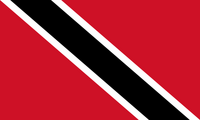| Republic of Trinidad and Tobago | |
|---|---|

| |
| Geography | |
| Continent: | South America |
| Capital: | Port of Spain |
| People | |
| Government: | Parlimentary Democracy |
| Head of State: | George Maxwell Richards |
| Other Information | |
| Language: | English |
| Religions: | Christianity, Hinduism |
| Affiliation | |
| UN Member State | |
Trinidad and Tobago is a small country just off the coast of Venezuela in South America. Its capital is Port-of-Spain and used to be a Spanish colony in 1802. It got independence in 1962. Its economy is mainly industrial. It scores relatively well in many of the 10 economic freedoms, and its economy has grown at an average rate of close to 7 percent over the past five years. The government has tried to diversify the economic base, and the country has evolved into a key financial center in the Caribbean region.
The government is a parliamentary democracy. Trinidad and Tobago has earned a reputation as an excellent investment site for international businesses and has one of the highest growth rates and per capita incomes in Latin America. Economic growth between 2000 and 2007 averaged slightly over 8%, significantly above the regional average of about 3.7% for that same period; however, it has slowed down since then and contracted about 2.7% in 2009. Growth has been fueled by investments in liquefied natural gas (LNG), petrochemicals, and steel. Additional petrochemical, aluminum, and plastics projects are in various stages of planning. Trinidad and Tobago is the leading Caribbean producer of oil and gas, and its economy is heavily dependent upon these resources but it also supplies manufactured goods, notably food and beverages, as well as cement to the Caribbean region. Oil and gas account for about 40% of GDP and 80% of exports, but only 5% of employment. The country is also a regional financial center, and tourism is a growing sector, although it is not as important domestically as it is to many other Caribbean islands. The economy benefits from a growing trade surplus. The MANNING administration has benefited from fiscal surpluses fueled by the dynamic export sector; however, declines in oil and gas prices have reduced government revenues which will challenge his government's commitment to maintaining high levels of public investment.